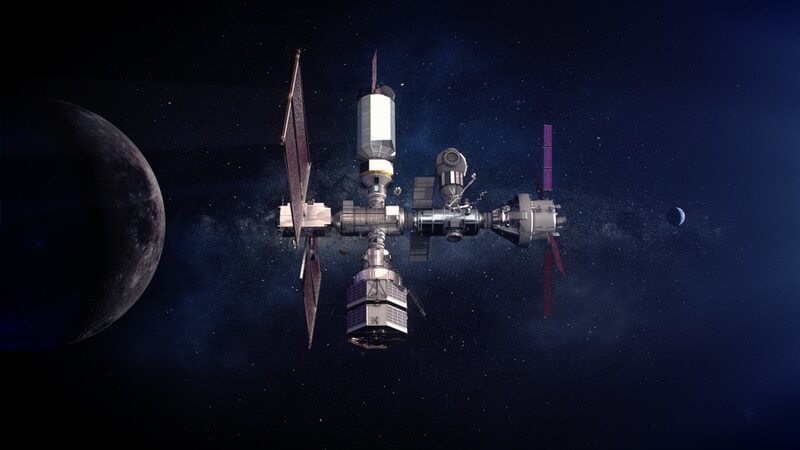14.12.2022

Nasa has ambitious plans to build a station in the Moon’s orbit. Called the Lunar Gateway, the station would host astronauts before they land on the lunar surface, using a human landing system. Photo: Nasa
The UAE is exploring opportunities to be involved in designing part of Nasa's planned space station that will orbit the Moon.
US aerospace company Boeing said it has held discussions with Emirates officials about the UAE providing an airlock module on the Lunar Gateway.
This is an airtight room that astronauts would use to enter and exit the space station.
John Mulholland, vice president and International Space Station programme manager at Boeing, told The National that the company was “actively working” with the UAE on the concept and design.
The Lunar Gateway falls under Nasa’s Artemis programme, which aims to put humans back on the Moon’s surface this decade.
“One of the things that the UAE is working on is the evaluation of whether they are going to put up an airlock module on the Gateway, which would be outstanding,” said Mr Mulholland at the Abu Dhabi Space Debate.
“And so, one of the things that we have been working hard on is trying to help the UAE come up with a concept and a design of what that airlock system would be like.”
As space agencies look to retire the ISS, their attention has turned to the Moon and Mars in this new era of space exploration.
The ISS, which has been operating since 2000, was made possible through the space agencies of different partners, including the US, Russia, Canada and European nations.
Now, emerging space nations such as the UAE have the opportunity to play a crucial role in newer, more advanced projects that would give them access to space.
“It is a great project. It would be a habitation module with an airlock and through the barter agreements, they have then got certain flights that they are going to be able to take,” said Mr Mulholland.
“So, it is a great opportunity for capability to be established … and it is a huge capability because within the space station — and Gateway essentially is a space station — you have to have an airlock so astronauts can go out and do repairs.”
There is no agreement that has been signed between the UAE and Boeing yet on the project, and Mr Mulholland said that the country was still evaluating.
However, Sean Fuller, international partner manager on the Gateway programme, said on Monday that an announcement would be made in a couple of months.
He said that Nasa was in “active negotiations” with a potential new partner to contribute to an airlock module, according to a tweet by space journalist Jeff Foust.
The UAE has been exploring ways of becoming involved in the Artemis programme.
The Emirates is one of the signatories of the Artemis Accords, a set of US-led international agreements that outline the responsible exploration of the Moon and beyond.
On Sunday, the country took a crucial step forward in its long-term Moon exploration programme, with the launch of the Rashid lunar rover into space.
It is expected to reach the Moon by the end of April. Rashid 2 will be launched into space aboard a Chinese spacecraft in 2026.
Saudi Arabia is another Arab country that is seeking to pursue massive projects in space. The kingdom is expected to announce a comprehensive space strategy early next year.
Mohammed Al Tamimi, governor of the Communications, Space and Technology Commission, said last week at the Abu Dhabi Space Debate that he saw space commodities as a “huge opportunity”.
He said they were holding “active talks” with international partners regarding opportunities in new models of space stations.
“We have heard lots of initiatives from the private sector, not only from a scientific point of view; we also hear about [the] commercialisation of space stations,” he said.
“We hear lots of announcements by multiple companies regarding space tourism and building a hotel as a space station, becoming like a commodity.
“For me, I see there is a huge opportunity. This is the right time in history of space where we can see real commercialisation of space.”
“And also there is more collaboration and active discussions right now between us in Saudi Arabia and other countries when it comes to building a new model for space stations.”
Companies such as Blue Origin, Nanoracks and Axiom Space have announced plans to build a station in low-Earth orbit.
These structures would be open to tourists, researchers and astronauts.
Quelle: The National
